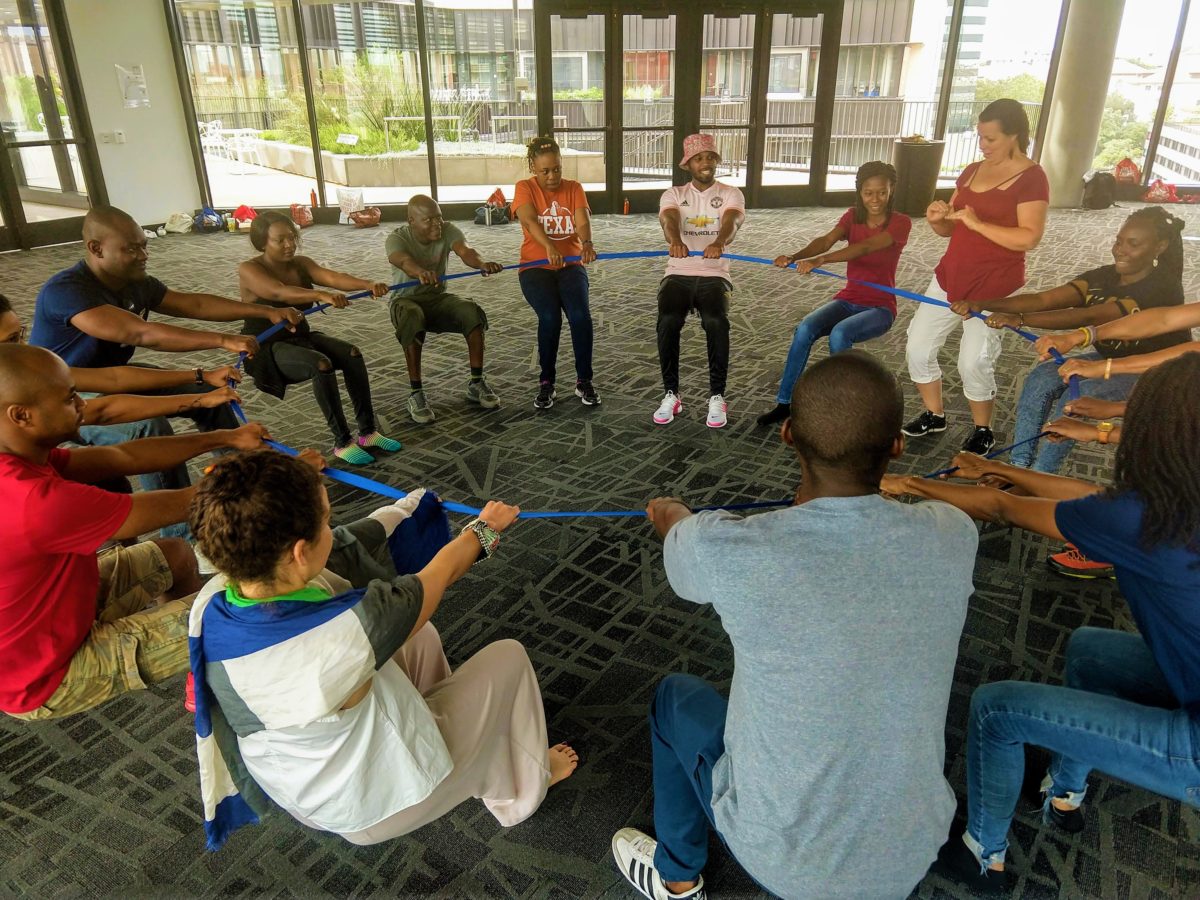Leadership Institutes

The Mandela Washington Fellowship Leadership Institutes are comprehensive executive-style programs designed to build skills and empower Fellows to lead in their respective sectors and communities through the themes of Business, Civic Engagement, and Public Management. Since 2014, educational institutions in 35 states and the District of Columbia have hosted Fellows for Leadership Institutes.
The six-week Institutes support the development of Fellows’ leadership skills through academic study, workshops, mentoring, networking with U.S. leaders, and collaboration with U.S. citizens. Each Institute also offers insights into U.S. society through site visits and cultural exchange. The Institutes strengthen connections between the United States and Africa and establish enduring partnerships between Fellows, local communities, and private businesses.
Learning from professors with real-world experience has made me understand more about servant leadership and how public managers have to relate to the public to benefit both the citizens and governments. As I leave the Fellowship to return and serve the people of The Gambia, I can confidently say I am better equipped to deliver the needs of my people.”
Fellowship Alumni, The Gambia
2025 Leadership Institutes

Leadership in Business
Leadership in Business Institutes provide an overview of U.S. entrepreneurial strategies and focus on developing skills in business and entrepreneurship. These institutes examine the development, history, and successes of U.S. enterprises with specific relevance to Sub-Saharan Africa and help Fellows build technical and leadership capacity in areas such as innovation and technology, business plan development, and financial management. The institutions hosting 2025 Leadership in Business Institutes are:
- Alabama A&M University – Huntsville, Alabama
- Clark Atlanta University – Atlanta, Georgia
- Drake University – Des Moines, Iowa
- Jackson State University – Jackson, Mississippi
- Purdue University – West Lafayette, Indiana
- Rutgers, The State University of New Jersey – New Brunswick, New Jersey
- University of Iowa – Iowa City, Iowa
- University of Nevada, Reno – Reno, Nevada
- University of Notre Dame – South Bend, Indiana
- The University of Texas at Austin – Austin, Texas
We got the very best blend of teaching, coaching, instruction, and bonding with the University community… We had hands-on visits to businesses, social enterprises, [and] innovation centers, which lent support to what we learned in [the] classroom, thereby enriching our experience and boosting our self-confidence [all] the more.”
Fellowship Alumni, University of Notre Dame
Leadership in Civic Engagement
Leadership in Civic Engagement Institutes provide an overview of civic engagement and community building in the United States. These institutes discuss similarities and contrasts with experiences and opportunities on the African continent and build technical and leadership capacity in areas such as strategic planning, organizational development, and the intersection of civil society with business and government. The institutions hosting 2025 Leadership in Civic Engagement Institutes are:
- Drexel University – Philadelphia, Pennsylvania
- Louisiana State University – Baton Rouge, Louisiana
- Michigan State University – East Lansing, Michigan
- The Presidential Precinct – Charlottesville, Virginia
- University of Delaware – Newark, Delaware
- University of Maryland, Baltimore County – Baltimore, Maryland
- The University of Tennessee, Knoxville & Tennessee State University – Knoxville, Tennessee
The Institute provided a broad curriculum relevant for civic leaders that included in and out of class learning, networking, field visits and volunteering. The diverse approaches allowed me to engage with facilitators and Fellows and provided opportunities for additional meetings [with Americans].”
Fellowship Alumni, Appalachian State University
Leadership in Public Management
Leadership in Public Management Institutes provide an overview of public management, administration, and leadership in government, regional or international organizations, or other publicly oriented groups and think tanks. The Institutes introduce Fellows to U.S. models and best practices in public management while building technical and leadership capacity in areas such as citizen engagement, resource management, financial management systems, and the intersection of government with business and civil society. The institutions hosting 2025 Leadership in Public Management Institutes are:
- Arizona State University – Phoenix, Arizona
- Bridgewater State University – Bridgewater, Massachusetts
- Georgia State University – Atlanta, Georgia
- Syracuse University – Syracuse, New York
- Texas Tech University – Lubbock, Texas
- University of California, Davis – Davis, California
- University of Minnesota – Minneapolis, Minnesota
- University of Tulsa – Tulsa, Oklahoma
- Wayne State University – Detroit, Michigan
I believe that the Mandela Washington Fellowship has made me a stronger and better leader and has challenged me to think outside the box… There can only be more, bigger, and better to come from me, my fellow Fellows, and the continent of Africa as a whole.”
Fellowship Alumni, Bridgewater State University

Common Leadership Curriculum
The Common Leadership Curriculum (CLC) provides a common leadership experience so that all Fellows have a shared language and a foundational knowledge to build upon as they return to their home countries. The CLC is guided by the perspective that leadership is not related to an individual’s professional level, but rather to their behavior and actions in whatever position they hold. It incorporates both a strengths-based approach – including the use of the CliftonStrengths® assessment which focuses on an individual’s natural talents in work and life – and the concept of Ubuntu. The curriculum uses active learning methods to give Fellows practical tools they can apply regardless of their sector interest or level of professional experience. Fellows return home with an initial action plan and strategies for leveraging their talents to effectively lead and contribute to their local communities.